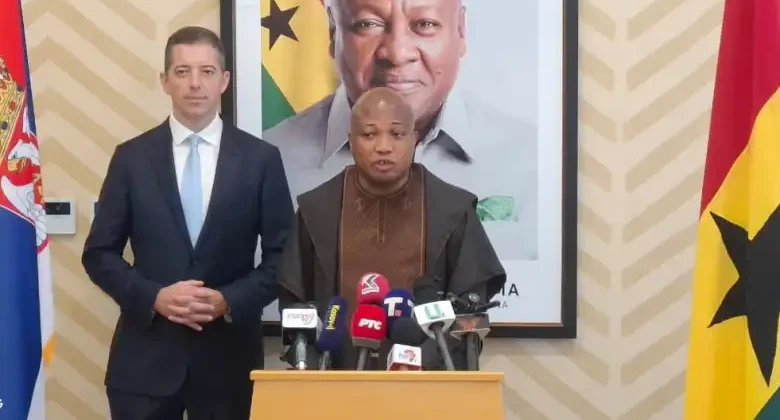During a three-day visit to Accra from July 15-17, 2025, Serbian Foreign Minister Marko Đurić and Ghanaian Foreign Minister Samuel Okudzeto Ablakwa signed multiple agreements, revitalizing a diplomatic friendship rooted in the Non-Aligned Movement of 1959. The agreements span labour mobility, education, defence, sports, and infrastructure, marking a new chapter in Ghana-Serbia relations.
Key Agreements and Initiatives
Labour Mobility MoU: Ghana will access Serbia’s 2025 initiative to issue 100,000 work permits, enabling Ghanaian youth to work in sectors like construction, healthcare, agriculture, ICT, and hospitality. This addresses Serbia’s ageing workforce while leveraging Ghana’s youthful population (median age of 20).
Educational Exchange: Serbia has allocated 51 scholarships for Ghanaian students under the “World in Serbia” initiative, with 30 additional slots planned for 2025. Ghana reciprocates by offering Serbian students opportunities to study African Sociology and African Studies at the University of Ghana.
Lithium and Technology Collaboration: With Serbia holding 11% of global lithium reserves, the nations agreed to share technical expertise in lithium exploration. They also committed to deepening cooperation in artificial intelligence, aligning with Ghana’s One Million Coders Programme and $1 billion Innovation Hub initiative.
Defence and Maritime Security: Serbia will support upgrades to Ghana’s Vessel Traffic Management and Information System through collaboration with the Ghana Maritime Authority and Serbia’s Vlatacom Research and Development Institute, enhancing over-the-horizon surveillance along Ghana’s coastline. Defence cooperation aims to bolster Ghana’s capacity against Sahel region terrorism.
Sports and Cultural Exchange: A Memorandum of Understanding on Sports and Recreation was signed to foster athlete training, coaching exchanges, and youth engagement, leveraging Serbia’s sporting excellence in football, basketball, and athletics.
Strategic and Economic Significance
Serbia, with a nominal GDP of approximately $82 billion, brings expertise in services, industry, AI, and lithium resources, aligning with Ghana’s goals in clean energy, digital innovation, and youth employment. Despite modest trade volumes, both nations see potential for growth. Đurić praised Ghana’s 24-hour economy initiative as “inspiring,” signaling opportunities for Serbian investment in agribusiness, technology, and logistics.
Cultural and Diplomatic Bonds
The partnership builds on historical ties, exemplified by Serbia’s contribution to the Accra International Conference Centre. Đurić described Ghana as a “pillar of stability in West Africa,” reinforcing shared values of sovereignty and multilateralism. The agreements promote cultural diplomacy through sports and academic exchanges, fostering people-to-people connections.
Opportunities for Ghana’s Private Sector
Ghanaian businesses are encouraged to seize this momentum in agribusiness, ICT, construction, education, and sports. Joint ventures, trade missions, and cultural exchanges with Serbian counterparts could drive economic returns and innovation.
Looking Ahead
The agreements position Ghana and Serbia for mutual progress in trade, technology, security, and cultural exchange. With Serbia’s support for Ghana’s maritime and defence capabilities and Ghana’s youthful workforce fueling Serbia’s labour needs, this partnership blends historical kinship with forward-looking collaboration. As both nations work to formalize these agreements in the coming months, the private sector and youth stand to transform shared intent into tangible progress.
By Aboagye Mintah, Entrepreneur and Writer on international business affairs (aboagyemintah@gmail.com)
Source: African Publicity








